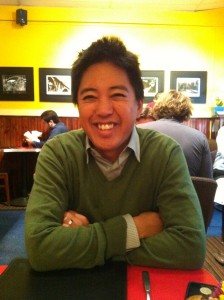
Chris Santiago is a poet, fiction writer, critic, and teacher. His writing has appeared in FIELD, Pleiades, The Asian American Literary Review, Canteen, Cha: An Asian Literary Journal, and elsewhere. He has been nominated twice for the Pushcart Prize, and has been a finalist for both the Stony Brook Short Fiction Contest and the Kundiman Poetry Prize (for his manuscript Tula). Chris is completing his Ph.D. in Literature & Creative Writing at the University of Southern California, where he is a Provost’s Ph.D. Fellow and ACE-Nikaido Fellow, and teaches literature & writing in the Thematic Option Program.
This April, we are returning to our Process Profiles series, in which contemporary Asian American poets discuss their craft, focusing on their writing process for an individual poem or poetic sequence of theirs. As in the past, we’ve asked Lantern Review contributors to discuss their process for composing a piece of theirs that we’ve published. In this installment, Christopher Santiago writes about his poem “Tam,” which appeared in Issue 5.
* * *
I wrote the first draft of “Tam,” I think, out of anger. It’s an older poem, and I was in my early twenties and mad about a lot of things, but one of the things that really got under my skin was pop culture, and portrayals of Asians and Asian Americans in particular. Miss Saigon, Claude-Michel Schönberg and Alain Boubil’s Vietnam War redux of Puccini’s Madame Butterfly, was the kind of cultural object that really drove me up the wall. The tale of Kim, a Vietnamese bargirl who commits suicide so that her son, Tam, can grow up in the States with his American ex-GI father, didn’t bother me when I first saw it as a teenager. But over the years, the memory festered—I won’t waste time explaining why—and only after I began to try to write seriously did it occur to me that this anger might be something I could use.
I was just starting out, and writing a lot of persona poems, partly because I felt that trying to get in someone else’s head allowed me to get outside of myself, and partly because I was (and still am) deeply interested in voice. My anger toward Miss Saigon—and texts that were like it—gave me energy, but it also made me inarticulate. As the poem unfolded, then, I felt the impulse to deflect, to approach the subject obliquely—from the point of view of Tam, who I imagined growing up haunted by the memory of his mother’s voice. That way, I reasoned, I could really poke holes in the musical’s phony premise, its false catharsis. I could build further into its world in a way that would, I hoped, reveal its glib and hollow heart.
After I wrote a few drafts, the poem sat on the back burner for years, until I started working a couple of years ago on a manuscript I’m tentatively calling Tula. I was happy to find “Tam” on an old hard drive, and happier still to find that one of my current obsessions had begun to take shape in “Tam” years before: my obsession with the way that unlearned languages haunt us. I never learned to speak Tagalog, or Ilonggo, or Bicolano—my mother tongues, or heritage languages—and I’m fascinated by the bits and pieces that I do know, the bodily traces of certain rhythms and intonations in the ears of 1.5 and 2nd generation folks like me. I’ve been reading these fascinating fMRI studies on the subject: the science, as far as I can tell, supports the intuition that Kim—her singular way of speaking—remains a part of Tam even after he can no longer recall (at least consciously) a single phrase of Vietnamese.
As for the poem, I still liked its bones, but thought perhaps it over-explained itself. I decided to strip it back, to let the silences bleed more, and to break the suite of episodes into shorter and more irregular fragments. I also hoped that reordering them might quiet some of the melodrama. I’d given Tam my anger, and think he deserved to feel it; some of it, I think, still bubbles up under the lid. But instead of belting his anger out under the spotlights, Tam mutters it under his breath. I hope that gives the poem at least a bit more bite and plaintiveness.